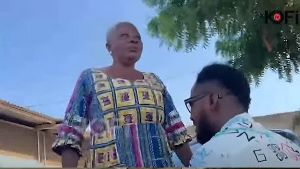 Motorcycle became a prized possession during the early phase of the pandemic in Kenya
Motorcycle became a prized possession during the early phase of the pandemic in Kenya
Moses Otieno has been grateful to his Boxer motorcyle, which enabled him to relocate from a shabby slum room to a decent one-bedroom flat that is both spacious and elegant in the suburb of Kenyan capital Nairobi.
"After buying a motorbike and working for some months, my life has been changing step by step. This job helped me to cater for my bills, to pay for my rent, to pay for my children's school fees, " said the 37-year-old father of three who bought the motorcycle three years ago.
Speaking to Xinhua after escorting his children to school and navigating the early morning traffic to cruise his China-made Boxer motorcycle to one of his clients in downtown Nairobi, Otieno said that switching from a sales job at a clothing store to a deliveryman has been a blissful experience."At least my former job at the clothing line enabled me to save enough money and buy a motorcycle. I ferried passengers for almost one year and later switched to ferrying goods," said Otieno.
His towering height and amiable personality have endeared him to clients who include retail chains, bookshops, wholesale school uniform dealers and gift shops.
"This is my third year as a deliveryman and I have cherished this rewarding though often grueling vocation," Otieno said at the entrance of Nairobi's largest retailer of school uniforms and a loyal client. He said that soon after becoming a delivery man, he relocated from one of the largest Nairobi's informal settlement where he lived for several years to his current one-bedroom flat. "Even my children are proud of the new living quarters that has ambience, round-the-clock security and ample space to play after completing their homework," said Otieno. He belongs to a growing army of Kenyan deliverymen who found a silver lining at the height of the COVID-19 pandemic.
According to Otieno, his motorcycle became a prized possession during the early phase of the pandemic when orders for delivery of essential household goods skyrocketed.
"During the pandemic, our job picked up very well and we were able to do so many deliveries -- foodstuffs, shaving machines, sanitizers, masks. I played a very big role, because people were not moving, the town was empty, people needed food and things that they used on a daily basis," he said. "During the lockdowns, I was able to make 15 to 30 deliveries a day. Some of the clients who procured my services include e-commerce firms, supermarkets, restaurants and coffee shops," he added. He said that his China-made Boxer 150 motorcycle withstood the grueling trips across Nairobi and its environs thanks to its sturdy features and ability to consume less fuel. "My motorcycle is fuel-efficient, can survive rough terrains and is easy to maintain since the spare parts are locally available," said Otieno.
His day usually starts at 5 a.m. when he freshens up, takes breakfast in the company of his wife and school-going children and later embarks on the journey to downtown Nairobi where most of his clients are based.
He said that navigating Nairobi's treacherous terrain with his motorcycle while on his way to deliver items has provided him with free tutorials on grit, resilience and mental agility. Otieno said that he was optimistic the delivery job which he has taken up with gusto will fulfil his dream of owning a car and venture into nascent markets in the countryside.
"I don't want to spend all my life riding bikes because I'm aging. I want to buy a small car and then a big car, to do delivery in another capacity or level because I have decided to do deliveries and I love it," he said.
BIG BUSINESS
Kenyan deliverymen became a cog in the fast-moving wheels of the country's digital commerce industry when the pandemic was at its peak amid seamless linkage between retailers and clients. They have used the two-wheeled machine to revolutionize transport of goods and passengers in Kenya, East Africa's largest economy.
Statistics from motorcycle assemblers association of Kenya indicate that 50 percent of an estimated 1.4 million of motorcycles that patronize the country's roads and highways are Chinese brands. The most prominent Chinese motorcycle brands in Kenya include Boxer, Jingchen and Haojin that are prized by riders owing to their resilience.
Kevin Mubadi, chairman of Boda Boda (motorcycle) Safety Association of Kenya said the industry is booming against a backdrop of youth bulge, changing lifestyles and growth of electronic commerce in the country. "The country is grappling with an unemployment crisis affecting the youth and the easiest option for them is to purchase a motorcycle and ferry passengers or goods for a fee, " said Mubadi.
With an average daily earning of 700 shillings (6.35 U.S. dollars), the sector's annual earnings are estimated at 357 billion shillings, said Kenyan President Uhuru Kenyatta in October 2020 when he launched the Boda Boda Investment Scheme to enhance their financial security amid COVID-19 related shocks.
"Every single day, boda boda operators collect 980 million shillings," said Kenyatta. "Some riders earn more than office workers and have a very flexible working culture," said Mubadi, adding that the COVID-19 pandemic offered a silver lining for riders amid surge in orders to deliver essential goods. According to Mudabi, motorcycle riders partnered with the government to ensure that face masks, hand sanitizers and soaps were delivered to underprivileged communities. "We felt some tremors when the pandemic hit the country but later reaped from contracts by retail and e-commerce giants to deliver essential commodities to households," said Mubadi.
Mubadi said that motorbike riders have been providing a cheaper and efficient mode of transport in rural areas and urban slums where mobility is hampered by poor road network and insecurity.
"Majority of the rural villages and urban slums are inaccessible due to lack of paved roads hence making the motorcycle an essential mode of transporting passengers and goods," said Mubadi. He said that Kenya's digital commerce industry that ranks among the fastest-growing in Africa, has provided a lifeline to motorcycle riders whose median age is 27 years. "Local electronic commerce giants like Jumia have signed contracts with riders to deliver goods to customers. Even traditional retail chains have a formal working partnership with riders," said Mubadi.
- Commonwealth countries must create 5,000 jobs everyday till 2030 - Foreign Affairs Minister
- Use COVID-19 fund to strengthen health care, immunization financing — HFFG
- Parliament records a new case of coronavirus
- Breach of coronavirus safety protocols: GMA calls for action
- Chadians line up for Sinopharm as coronavirus vaccination campaign begins
- Read all related articles












